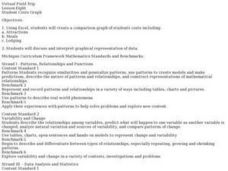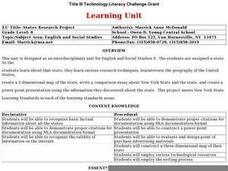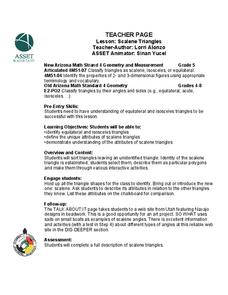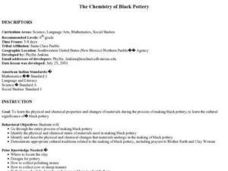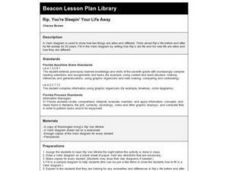Curated OER
Hot Rocks
Learners demonstrate that setting of plaster and cement is a change, which involves a release of heat energy, use data collected experimentally to construct comparison graphs and analyze the graphs to make predictions about future...
Curated OER
Metaphors, Personifications, Similes, and Hyperboles
Fourth graders discuss prior knowledge of the terms simile, hyperbole, metaphor, and personification. They then listen to the definitions of each and write a hyperbole, personification, simile, and metaphor to describe a Mr. Potato Head...
Curated OER
Fall Similes and Metaphors
Young scholars interpret what a similies and metaphors are. They give examples of similies and metaphors. Pupils write different similies and metaphors using fall or autumn descriptive words. Students base their comparisons on facts,...
Curated OER
Seesaws
Students make direct comparisons between objects using balance and spring scales. They also are encouraged to estimate which object is heavier by holding the objects before using the balance scales. Comparing the masses of objects is the...
Curated OER
"Crossing Brooklyn Ferry"
Students study transportation in mid-19th-century Brooklyn. They look at several photographs of Brooklyn transport from the era and read Walt Whitman's poem "Crossing Brooklyn Ferry." In addition to making critical
observations and...
Curated OER
ABC's Of Figuring Interest
High schoolers participate in a lesson of figuring interest. This is done in order to strengthen number calculation skills while computing the interest when buying different things. This done in conjunction with using credit to make...
Curated OER
Made Round To Go Round
In this lesson students investigate what it would cost to furnish one room of their choice by shopping on the Internet. Both Australian and American dollars are to be given for each item to demonstrate the difference between two...
Curated OER
Student Costs Graph
Students calculate the mileage, gasoline costs, and travel time and costs for a vacation. They conduct a virtual field trip, and create a comparison graph of costs using Microsoft Excel software.
Curated OER
Toilet to Tap?
Students answer the question, 'Should San Diego reclaim its water for fresh drinking water?' They make a poster explaining the position: "Yes," drink reclaimed water; or "No," don't drink reclaimed water.
Curated OER
Macbeth Madness
Students participate in various social studies activities in correlation to William Shakespeare's Macbeth. In this Macbeth lesson, students study maps of Scotland, England, and Norway to identify locations mentioned in Macbeth. Students...
Curated OER
Comparing Pancho Villa and Emiliano Zapata
Students research the Internet to find and record information from biographies of Pancho Villa and Emiliano Zapata. They create graphic organizers that provide visual comparisons of the Mexican Revolutionaries.
Curated OER
States Research Project
Eighth graders create an in-depth research report on a state. They conduct Internet research, write a comparison essay about New York State and their assigned state, create a 3-dimensional map, and develop a Powerpoint presentation.
Curated OER
Using Similes, Synonyms, and Antonyms
Children study similes, synonyms, and antonyms and identify examples in the book Quick as a Cricket by Audrey Wood. They write short stories about themselves using antonyms, synonyms, and comparisons of themselves to animals. They draw...
Curated OER
Partnership in Science Education
Students compare two regions of the world, their own and one many miles away. They explore and compare these two places and prepare a report that gives a complete comparison and description of the two regions. They collaborate in...
Curated OER
Similes and Metaphors
Students use similes and metaphors to enhance their creative writing. In this creative writing worksheet, students learn the definitions of and differences between similes and metaphors. They practice making similes using the list given...
Curated OER
Infusing Equity by Gender into the Classroom
Students discover the biases between the two genders by comparing males and females in different species. For this gender identity lesson, students research National Geographic Magazine and view videos demonstrating the differences...
Curated OER
Scalene Triangles
Fifth graders identify and classify scalene, equilateral, and isosceles triangles. In this triangle lesson, 5th graders define the different attributes of 3 types of triangles and sort them by descriptions and comparisons. Students...
Curated OER
Language Arts: Predicting and Clarifying Techniques
First graders discover predicting and clarifying skills while reading "The Old Woman and Her Pig." During the reading, they check their predictions while evaluating the characters, setting, problems, and solution. On the second day,...
Curated OER
Teaching Nutrition Using the Food Guide Pyramid
Second graders explore how to make healthy eating choices. There are goals included for students to meet by the end of fifth grade.
Curated OER
The Chemistry of Black Pottery
Sixth graders create pottery out of black clay using traditional methods. They demonstrate appropriate Native American cultural traditions related to the making of black pottery, including prayers to Mother Earth and Clay Woman.
Curated OER
Hanging Around
Students explore weight by building a spring scale and observing how it responds to objects with different masses. Each team of students can make their own spring scale by following steps which are specifically outlined in the plan. As...
Curated OER
Study Buddies - Bar Graphs
In this data collection worksheet, learners work with a partner to make 3 small bar graphs after finding the proper number of circles on the first page. They look at a page of a variety of shapes and separate the circles into black,...
Curated OER
Rip, You're Sleepin' Your Life Away
Third graders read Washington Irving's, Rip Van Winkle. They compare and contrast Rip Van Winkle's life before and after he slept for twenty years. They complete a Venn Diagram while making these comparisons.
Curated OER
Individualism
Students demonstrate knowledge of the understanding of American individualism, specifically four areas: decision making, expressing opinions, competition, and obligation.









